Beau Willimon Rewrites The Narrative Of ‘Mary Queen Of Scots,’ As Well As His Own
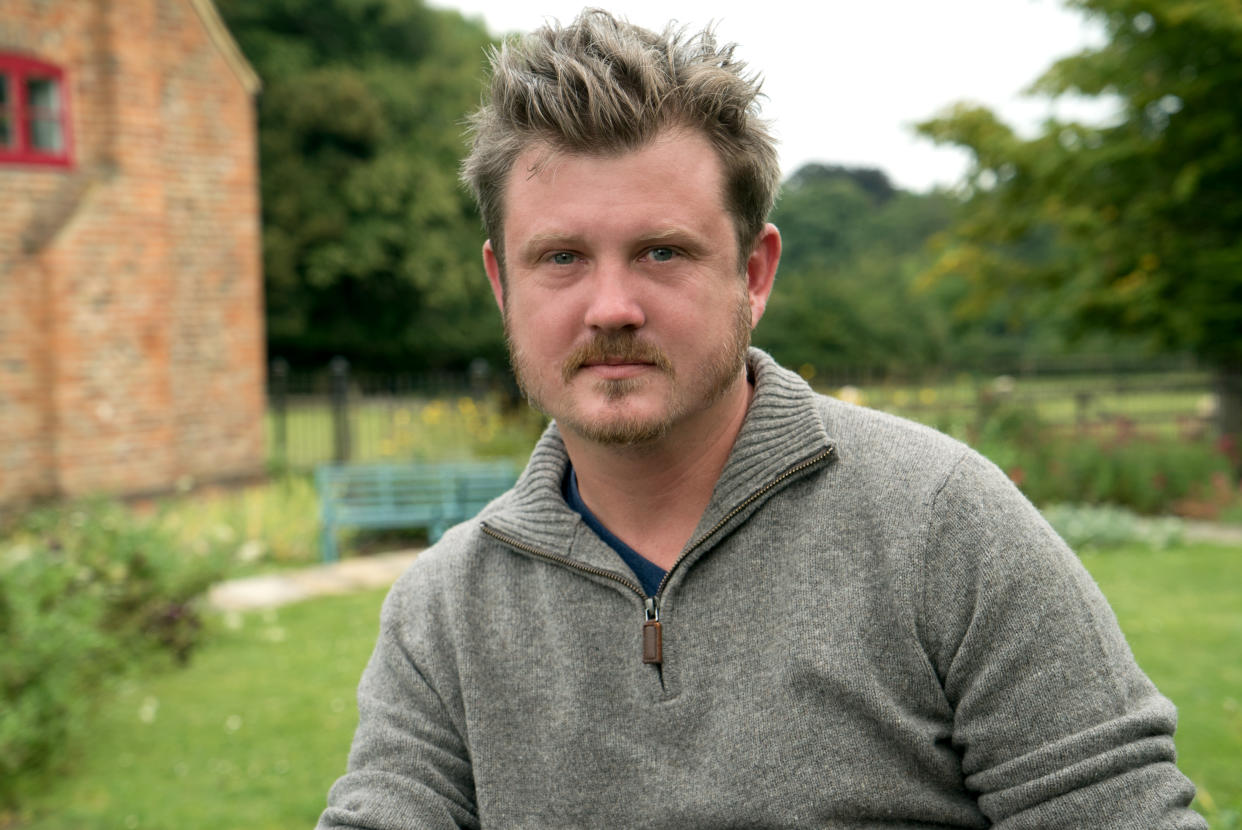
While writing the script for Mary Queen of Scots, Beau Willimon spent a lot of time with two fascinating historical figures—Queen Elizabeth I, and her cousin, Mary Stuart—coming to identify personally with these women, for they ways in which they were devalued and misunderstood. For Willimon, as with these rulers, one problem is the narratives of others, which can give a false impression, diminishing attention paid to that which is true. As a writer, there are always two voices to contend with—the voice of the critic, who seeks to label and dissect, and the voice of the writer himself—and rarely do they meet. With regard to Mary Queen of Scots, Willimon had several questions in mind: “What are the molds that people want to impose on you? And what’s to be done about them?”
The feature debut of Josie Rourke, starring Saoirse Ronan and Margot Robbie, the 16th century drama centers on two indomitable queens, with Mary making every move to usurp Elizabeth’s crown, despite the rapport and mutual understanding they share. In writing the film, Willimon ignored much historical writing about the pair, in favor of that of Dr. John Guy, who challenged centuries-old notions of the monarchs, setting the record straight.
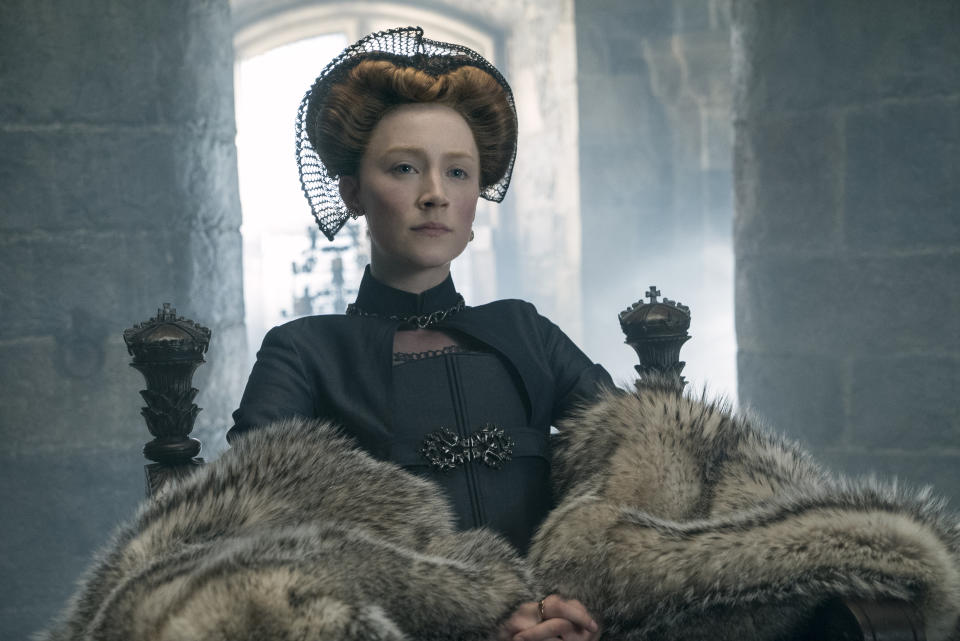
Speaking with Deadline recently, Willimon did the same for himself, challenging the popular notion that he is a “political writer.” “I’ve written 14 plays, only one of which took place in a political world. That was Farragut North, which became Ides of March, and Ides of March led to House of Cards. But really, you follow the opportunities where they come, and for me, early in my career, that one work led to another,” he says. “House of Cards was amazing in opening a lot of doors for me, but my focus as a writer is not to write political drama.”
While Mary Queen of Scots centers on palace intrigue, Willimon suggests that it “has nothing to do with House of Cards.” I note, as a counterpoint, that in their press materials for the film, certain powers at be have emphasized the very parallel he insists does not exist. “Sure, people will draw links, and people have to market things,” he concedes. “But there are political elements to all stories—any story that has anything to do with power—and all human stories have something to do with power, whether it’s explicitly in the political world or not.”
Paying homage to the “extraordinary” talents of Rourke and the film’s two stars, “who brought a level of specificity and dimensionality to these roles that I think makes them lasting,” the writer recognizes that at the end of the day, people will talk, and stories will be told. “I think particularly [in comparison] to those two women, and a lot of women in power, [with] those sorts of impositions of narratives, I have it easy,” he admits. “I’m very lucky to be able to write movies and TV shows, and the narratives that were being imposed upon them were a million times more challenging, and difficult to break out of.”
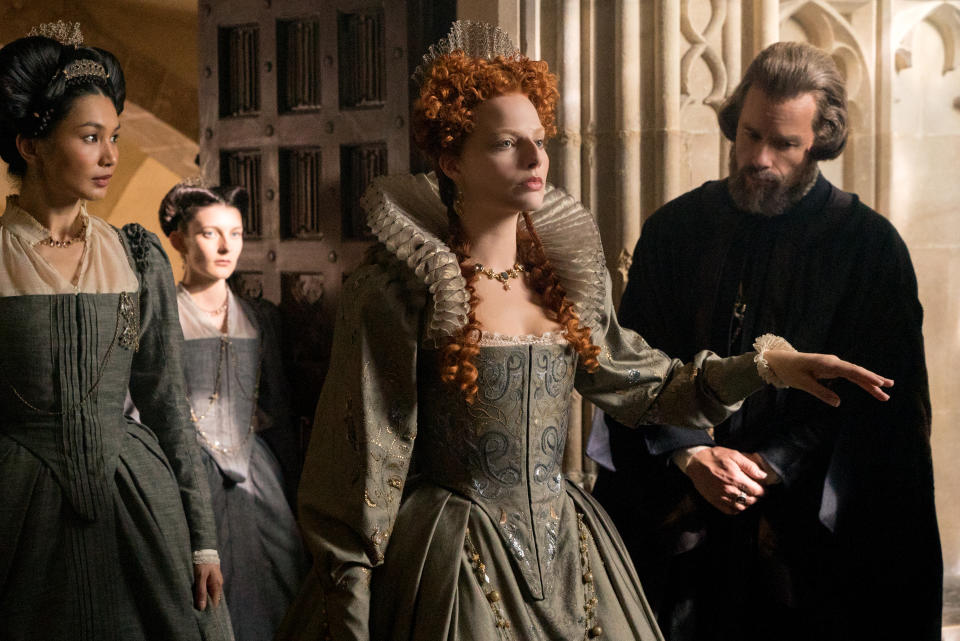
Before Mary Queen of Scots, Josie Rourke was known for her work in the theater. Had you come across her, with all your work in that world?
I first got to know Josie when she was running the Bush Theatre in London. I don’t know if you’re familiar with the London theater scene, but the Bush, especially when she was running it, was one of the premier theaters for finding and staging bold new work by fresh voices. It’s a tiny theatre, only 81 seats, but the work she was doing resulted in a whole generation of playwrights that are the most important voices in the English theatre scene, and her work has gone worldwide.
At the time, we had the same agent, and that’s how I got to know Josie. We hit it off right away, and vowed pretty early on that we were going to find a way to work with one another. We always thought that would be in theater, but life and work gets in the way. Then, she became attached to this project, and asked if I was interested in writing the script, and it was a no-brainer for me. Saoirse was already attached to play Mary, and this era of history is super fascinating to me. I’m a history buff; I was a history major in college, along with a visual arts major, and Elizabethan history in particular is one I’ve always found fascinating.
What aspects of this story were most interesting to you? What ideas presented themselves first, in terms of how you would approach it?
You had two rivals, who were also the only two people on the planet that could really understand what it was like to be in the other’s shoes. This story has been told before, both on stage and on screen, and we wanted to bring something fresh to it. I think it’s an incredibly poignant story for 2018. Unfortunately, a lot of the things that Mary and Elizabeth had to contend with in their own time, we see versions of here in the present. The amount of scrutiny and opposition that these two women had to face—not just from each other, but in some ways, even more so from within their own kingdoms—it was quite extraordinary that either of them was able to maintain power for as long as they did. Particularly Elizabeth, for almost half a century.
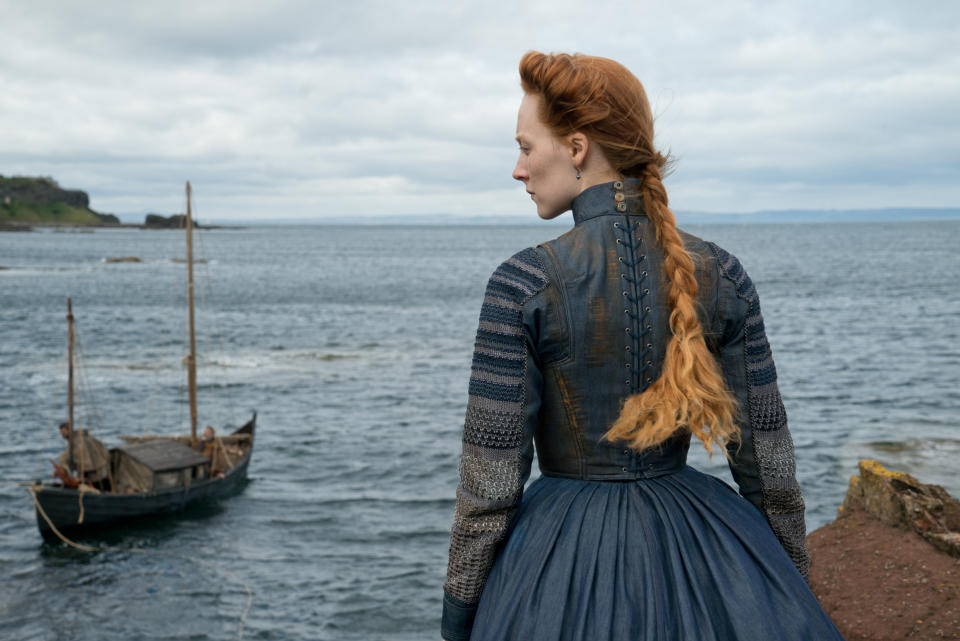
From the earliest stage, Josie and I were talking about the relationship between these two women, [that] were quite intimate with one another. Although they never met in person, their letters to each other were vulnerable, were honest. As much as they were at times trying to project strength, and put on façades, and jockey diplomatically, you can really see an effort between these two women to connect, and that their preference was peace, in finding an amicable way to coexist. And yet, the tectonic, political forces at play during that time doomed that relationship from ever fully bearing the fruit of peace. To see how these two women in very different ways navigated those obstacles and oppositional forces, both with and against one another, we thought would be a fascinating lens through which to look at this story.
We [drew] most of our work from John Guy’s rather recent monograph on Mary, Queen of Scots, and the reason for that was because he took a bold and fresh approach to Mary that really went against the grain of the historiography that came before him. He argues and proves historically that she was a lot more politically savvy than she’s typically been given credit for. She went to France when she was only a little girl, and grew up in the courts of France; she was crowned the Queen of France when she was still a teenager. In many ways, she had much more experience as a monarch, and in political matters, than Elizabeth did. For most of her childhood, she was a bastard child, exiled to obscurity, in fear for her life, and only through an extraordinary series of events, became crowned herself. You’ve often seen Mary portrayed in the past as a young, naïve, impulsive, reckless, emotional woman who was not fit to rule, and what John Guy argues is that she actually knew exactly what she was doing. She made her decisions deliberately, and early on, those decisions seemed to be far better than the decisions Elizabeth was making.
When you look at her story that way, what you do is flip the stereotypes we’ve often come to associate in the relationship between these two women. Mary, in particular, I think, burnished Elizabeth into the monarch that you’ve come to know in history. We often think of her as this resolute, armored, wise and savvy political ruler, but she didn’t start out that way. She started out insecure, indecisive and someone who, I think, learned a lot from Mary, and took the best of it, and left the worst of it, and became the Elizabeth that we now know.
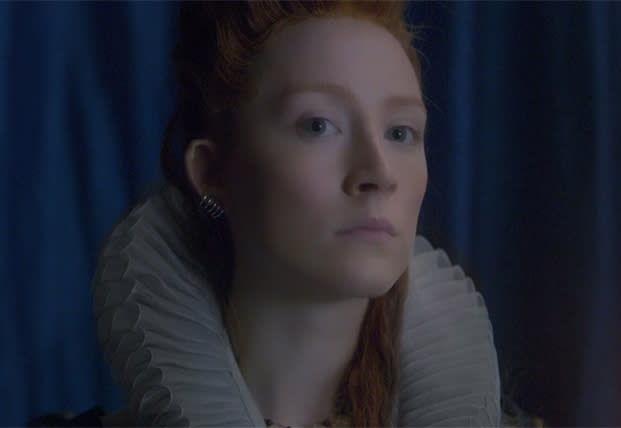
As you’ve indicated, the film presents startling parallels to the contemporary world, in terms of the treatment of women—and women in power, specifically. Rourke has suggested that films like this can perhaps promote change, reminding us of the longevity of certain issues, throughout history, so that the same mistakes will not be repeated now.
Look, it’s not like I led with our modern day, contemporary examples, trying to fashion a story of Mary and Elizabeth to that mold. Really, it was just being aware that there are a lot of modern examples, that there are similarities, and I think Josie’s right. This didn’t come from nowhere. We’re looking at millennia of misogyny and sexism when it comes to women in positions of power. If you think of even some extremely recent examples, like Congresswoman-elect Ocasio-Cortez, there was a photo that went viral where some “reporter” had taken a photo of her, and said something to the effect of, “This jacket and coat doesn’t look like a girl who struggles.” And if you look it up, you’ll see it got a massive backlash.
This was in relation to her claim that she couldn’t afford rent in Washington D.C., prior to her tenure in Congress.
Can you imagine the same photo and comment being made about a Congressman-elect, and his suit from the Men’s Warehouse? Probably not. The fact that he called her a girl instead of a woman, or a Congresswoman-elect…The level of scrutiny placed even just on the façade of a woman in power, even more so than the substance within, I think is something Mary and Elizabeth had to contend with a lot. They had to put a lot of thought into how they comported themselves in front of their courts, and to each other. They put a great degree of care into their physical appearance, not necessarily because they wanted to, but because it was demanded of them. And you could look at an example on the right. Look at Melania Trump. Whatever your politics are, the amount of obsessiveness about her physical appearance, what she wears, I think is rooted in a long history of reducing these women in power to mere physical appearance.
On Twitter, you’ve often spoken out against President Trump. It often seems as though he might share those values that perpetuate this situation.
Certainly, you can see it in his behavior, but I think it extends beyond Trump. There’s plenty of this, if maybe not as explicit, on the liberal side, as well. You could look at Nancy Pelosi’s plight right now to maintain speakership in the House, and there’s a compelling argument to be made that she would not be facing this level of opposition if she weren’t a woman. And a lot of the qualities that make her a successful speaker, by many, are still seen as unseemly in a woman—her strength, her scrappiness, her defiance. These are things that men will often be lauded for, but women not so. So, I think it extends far beyond Trump. I think he’s an exaggerated symptom of a cultural disease, but we have to look beyond him, even to those who might criticize or attack him, who aren’t being self-aware of their own contribution to this disease.
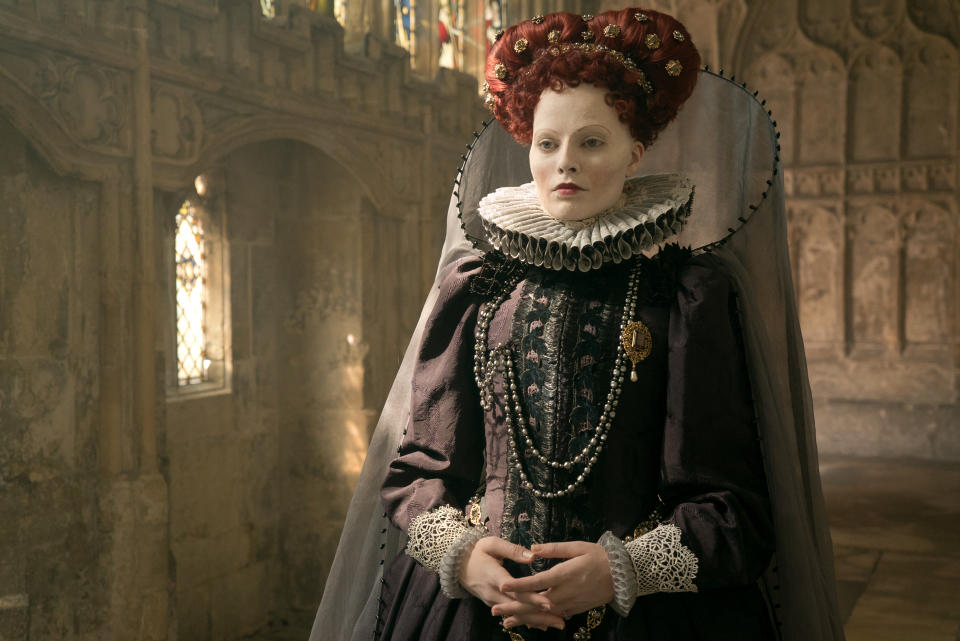
Questions of gender aside, what do you think the story reflects with regard to our times?
It often feels unrealistic to some people that everything that we portray in the film happened in the course of just seven years. Mary found herself betrayed multiple times by the men in her life. She went through two marriages, had a child, two rebellions, found herself arriving back to Scotland as an anointed Queen, and abdicating before she had reached the age of 30. When you look at all these things, and the speed and intensity with which they’re happening, I actually think that’s somewhat analogous to what’s happening now.
We feel overwhelmed by the amount of events and news that are happening. They’re occurring so fast that we can’t even seem to keep up, and I think that is very much how it must have felt during the mid-16th century, which was an incredibly tumultuous time, that was actually quite divisive between the Protestants and the Catholics, in many ways similar to the way we might see divisiveness here in our country between Republicans and Democrats, or between Labour and Tories in England, or right and left across the world. We just feel so inundated with all of these things we’re trying to grapple with, during a time of political chaos, and that was precisely what they were contending with, as well.
Rourke credits you as being a great writer of female characters. For you, what does that come down to?
I think more than anything, it’s being open to the human condition. It’s listening, observing and questioning your own preconceptions about everything, which should be the duty of every writer, regardless of whether they’re a man or a woman, or what their background is. When I look at any character, I don’t necessarily start with gender. I look at the universal aspects of their character, to which all people should be able to relate. We all understand what betrayal is, what loss is, what love is, what lust is, what fear is, what joy is. It’s what makes us human, and if you start with that, then your character, regardless of what gender they are or, what their background is, will have a core of honesty to them. I simply look at all characters as interesting and complex. If you do that, you’re writing humans, and that’s my goal.

You’ve said you never set out to write political dramas. If these kinds of projects aren’t your focus, what is?
My focus is to write about whatever I find interesting and compelling, whatever world that happens to take place in. People often want to try to reduce people to a through line, as though careers and artistic paths make sense. They want to create a narrative, saying, “A leads to B, leads to C,” and, “This is the thing that so-and-so is interested in. This is their style. This is their focus.” And I don’t think artists mostly function that way. I think that it’s a project of constantly evolving and expanding curiosity. If you want to draw thematic links between works, that can be interesting, but I don’t know many artists who approach their own work that way.
But for instance, the TV show I’m working on right now, The First, couldn’t be more different than House of Cards, or Farragut North. It’s about flawed people—all people are flawed—trying to accomplish something noble. Whereas, in House of Cards, what the protagonists were seeking was an almost hollow, but insatiable desire to pursue power for its own sake. So, if I were to draw a link—and I always hesitate to overanalyze my own work—I’m more interested in stories where people are trying to accomplish something that’s impossible, or nearly impossible, and being taken to their limits in order to do so, whether that’s good or bad, noble or self-serving. Because it’s at those limits that I think their true character is tested and revealed.
Since 2017, you’ve been serving as President of the WGA East. Why did you take that position on, and what has it meant for you?
The way I got involved in the WGA was Tom Fontana. He ran Homicide; he created Oz, which was really the first major subscription show, before even Sopranos. David Simon was a mentee of his, and he was very involved with the guild for many years. He still is, but he encouraged me to run for council, and I wasn’t actually that familiar with the guild at that time. He got me hip to it, and I ran for council, and was lucky enough to get elected, and what I found was that we had an incredibly vibrant community of writers, unionized with power and leverage and solidarity, to look out for and advance each other together. My politics are written on the wall; I’m a pretty liberal guy, so I’ve always supported and believed in the labor movement, and this was an opportunity to be directly involved in a vibrant and growing union.
Certainly, the union is something that became very important to me, because one of the early lessons I learned as a writer was that you can’t do it alone. It’s an incredibly solitary profession, and what you realize is that it’s the people who are your champions, the people who believe in you, and who you believe in, and communicating with each other, and looking out for each other, that allows you all to rise together. The guild offers you an opportunity to serve your fellow writers, in an explicit and profound way that goes beyond the work, but just to basic human needs like health care, like a pension. Writers often face a lot of instability in their lives, and knowing whether you’re going to be able to make rent, or pay for health care, is the same sort of fear that every American faces. To be able to work, with a lot of others, toward providing a little bit more stability and certainty in a very uncertain and instable life, actually contributes to the quality of the work. The less those things are hanging over your head, the more you can focus on telling great stories, and we all benefit from that. It also requires a lot of humility, to get out of your own head, to get out of your own self-centered pursuits, and remind yourself that you’re a servant to your peers.
Related stories
'Mary Queen Of Scots' Hair & Makeup Designer Talks Transforming Margot Robbie Into Queen Elizabeth I
Kevin Spacey Pleads Not Guilty To Groping Man In Nantucket Restaurant
Get more from Deadline.com: Follow us on Twitter, Facebook, Newsletter

